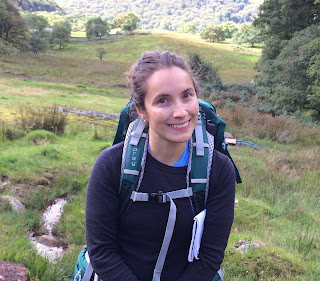GSA Geobiology and Geomicrobiology
This is a website for the Geobiology and Geomicrobiology Division of GSA
Wednesday, June 12, 2024
2024 Division Awards for Outstanding Geobiologists
Friday, November 17, 2023
2023 Divsion Awards for Outstanding Geobiologists
Every year the GBGM executive committee selects exceptional scholars to receive awards for their accomplishments in research, education/mentoring, and service in geobiology. This year we had an exceptional list of nominees so thanks to all those who nominated someone!
We are pleased to announce that the 2023 awards go to Kristin Bergmann (pre-tenure), Colleen Hansel (post-tenure), and Gabriela Mángano (distinguished career). Please check out their brief biographies below and explore their websites for further details about their research.
Pre-Tenure Award Recipient: Kristin Bergmann (MIT)
Post-Tenure Award Recipient: Colleen Hansel (Woods Hole Oceanographic Institution)
Distinguished Career Award Recipient: Gabriela Mángano (University of Saskatchewan)
Tuesday, September 26, 2023
GBGM Student Presentation Awards at GSA 2023
Monday, June 13, 2022
2022 Division Awards for Outstanding Geobiologists
Every year the GBGM executive committee selects exceptional scholars to receive awards for their accomplishments in research, education/mentoring, and service in geobiology. This year we had an exceptional list of nominees so thanks to all those who nominated someone!
We are pleased to announce that the 2022 awards go to Lidya Tarhan (pre-tenure), Cara Santelli (post-tenure), and John Valley (distinguished career). Please check out their brief biographies below and explore their websites for further details about their research.
Pre-Tenure Award Recipient: Lidya Tarhan (Yale University)
Post-Tenure Award Recipient: Cara Santelli (University of Minnesota)
Distinguished Career Award Recipient: John Valley (University of Wisconsin-Madison)
Tuesday, January 25, 2022
Nominate your colleagues for the 2022 GSA GBGM Awards!
Dear Geo(micro)biologists,
Every year the GSA Geobiology and Geomicrobiology division selects three exceptional researchers to receive pre-tenure, post-tenure, and distinguished career awards (or equivalent career stage in a non-tenure track position). For details on past awards, see the GBGM website. Since 2018, the division leadership has solicited nominations from our members in order to create a more diverse and inclusive nominee pool, both in terms of academic fields and demographics. We also hope this process allows our members to feel more involved and empowered to nominate the people who have made a difference to them or their (sub)field.
Please use the nomination form to identify exceptional researchers who you think should be recognized, along with justification (max. 500 words). Final nominees will be selected by the GBGM division representation committee from amongst this pool, and awarded based the nominee’s complete portfolio (i.e., research, mentoring, service, and leadership). Please note that you must confirm that the person you are nominating has not breached GSA's Code of Ethics & Professional Conduct nor is under investigation for any action that would be a breach of GSA's Code of Ethics & Professional Conduct.
We're grateful for your participation in this process - we know that your time is valuable, but this is one of the most important things the division does, and we think the community should nominate our awardees. Please submit your nominations to Vicky by Sunday, March 20th.
We look forward to being overwhelmed with nominations!
Vicky, Trinity, David, Emmy, Lydia, Brandt, Rowan, Alison, and Zoe (a.k.a. your Geobiology and Geomicrobiology Division Representatives)
Friday, October 22, 2021
Winners of the 2021 GSA GBGM Division Student Presentation Awards
It is our pleasure to announce the winners of the GSA 2021 student presentation awar
We would also like to express our deepest gratitude to our members who judged this year's competition. Without your feedback and support, this endeavor would not be possible.
We'd like to thank all of the students who contacted us and put their names forward for consideration. It was a real privilege to see and hear about the work you've been doing, and we encourage you to enter again next year. Recognizing the excellent work of our members is the most important aspect of the GBGM division, so please stay in touch. It is wonderful to see the faces of the student population of GSA GBGM and there is a bright future ahead for this group!
Tuesday, September 28, 2021
The University of Southern California Department of Earth Sciences invites applications for a position in Geobiology at the level of Associate or Full professor
At USC, Geobiology is interpreted broadly, including geomicrobiology, biogeochemistry, carbon cycles and proxies, ocean acidification, astrobiology, source to sink processes, earth-atmosphere-biosphere co-evolution, global change, carbon sequestration, paleoenvironments/
Located in central Los Angeles, USC serves a transnational student body and provides unique opportunities to engage in research, teaching, and service within an urban sphere, as well as easy access to the broader Southern California environment. The position offers opportunities to interact with the Wrigley Institute for Environmental Studies and the Wrigley Marine Science Center on Catalina Island.
Candidates should submit a full CV, research and teaching statements (1-2 pages each), names and email addresses of 3-5 individuals who could provide letters of recommendation, a statement on how you would foster diversity at USC, and a brief description of possible opportunities for interaction with the Wrigley Institute for Environmental Studies, if applicable.
To be considered for this position, applicants are required to submit an electronic application at https://usccareers.usc.edu/
USC is an equal opportunity, affirmative action employer. All qualified applicants will receive consideration for employment without regard to race, color, religion, sex, sexual orientation, gender identity, national origin, protected veteran status, disability, or any other characteristic protected by law or USC policy. USC will consider for employment all qualified applicants with criminal histories in a manner consistent with the requirements of the Los Angeles Fair Chance Initiative for Hiring ordinance.








